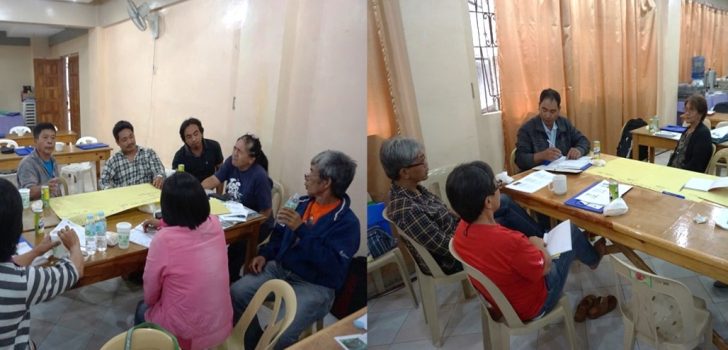 Proponent Groups (PGs) of the Benguet Arabica Coffee Enterprise, a subproject under the I-REAP Component of PRDP deliberate on the risk assessment of coffee from farm production to postharvest handling during the Phase I Training for the Installation of Internal Control System (ICS) held on April 19-21, 2017 at the Strawberry Valley Hotel and Restaurant, La Trinidad, Benguet. (Photos by ESTaquio, DA-PRDP CARPCO InfoACE Unit)
Proponent Groups (PGs) of the Benguet Arabica Coffee Enterprise, a subproject under the I-REAP Component of PRDP deliberate on the risk assessment of coffee from farm production to postharvest handling during the Phase I Training for the Installation of Internal Control System (ICS) held on April 19-21, 2017 at the Strawberry Valley Hotel and Restaurant, La Trinidad, Benguet. (Photos by ESTaquio, DA-PRDP CARPCO InfoACE Unit) Benguet Arabica Coffee Enterprise moves forward with GAP
La Trinidad, Benguet – “Let’s present our farms sanitary.” That is the main point of the Code of Good Agricultural Practices (GAP) as emphasized by Prof. Valentino L. Macanes of Benguet State University – Institute of Highland Farming Systems and Agroforestry (BSU-IHFSA) during the Training on the Installation of Internal Control System (ICS) to the proponents of the Benguet Arabica Coffee Enterprise under the DA’s Philippine Rural Development Project (PRDP).
“Food Safety and quality is one of the most prominent concerns worldwide and consumers are getting more conscious on how products are handled from production to the market,” Macanes added.
The first phase of the activity was held on April 19-21, 2017 at Strawberry Valley Hotel, La Trinidad, Benguet. Farmer-representatives from the Proponent Groups (PGs) of the enterprise subproject led by the Kibungan Arabica Coffee Growers Multipurpose Cooperative (KACGMPC) with the 11 affiliate PGs participated in the activity. During the training, they were oriented on the Code of GAP for Coffee from primary production to postharvest practices and ICS installation.
As part of Phase I, the participants also accomplished two workshops on risk assessment and the organizational structure of their ICS Committee with corresponding personnel qualifications and functions/ responsibilities. Outputs were later presented and critiqued for improvement.
The training is a four-phase activity that intends to prepare the proponents of the coffee enterprise for GAP certification, orient them on the Philippine National Standards (PNS) on GAP for coffee, develop and install ICS, train internal pre-audit inspectors on inspection and empower the farmer groups to sustain their compliance certification.
Upon the completion of ICS Phase IV, the PGs will have a final ICS Manual comprising practical standards and policies that each coffee farmer should follow to ensure the quality of their coffee. It shall serve as a binding commitment to the coffee farmers as well, to adhere to one product standard.### (Elvy S. Taquio, DA-PRDP CARPCO InfoACE Unit)
